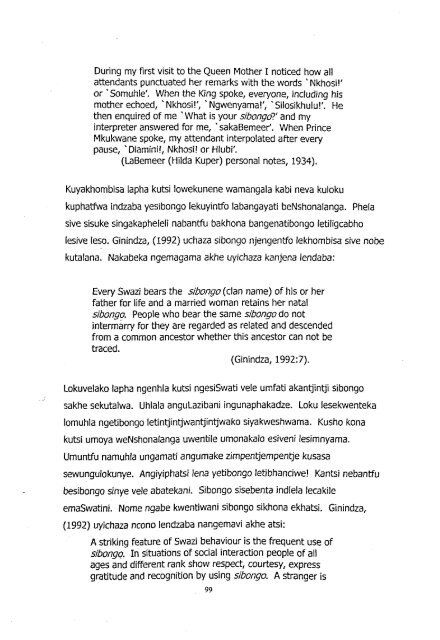ENYUVESIYAKAZULU - UZSpace Home
ENYUVESIYAKAZULU - UZSpace Home
ENYUVESIYAKAZULU - UZSpace Home
You also want an ePaper? Increase the reach of your titles
YUMPU automatically turns print PDFs into web optimized ePapers that Google loves.
During my first visit to the Queen Mother I noticed how all<br />
attendants punctuated her remarks with the words' Nkhosi!'<br />
or 'Somuhle'. When the King spoke, everyone, including his<br />
mother echoed, • Nkhosi!', . Ngwenyama!', •Silosikhulu!'. He<br />
then enquired of me . What is your sibongo?' and my<br />
interpreter answered for me, •sakaBemeer'. When Prince<br />
Mkukwane spoke, my attendant interpolated after every<br />
pause, •DlaminH, Nkhosi! or Hlubi'.<br />
(LaBemeer (Hilda Kuper) personal notes, 1934).<br />
Kuyakhombisa lapha kutsi lowekunene wamangala kabi neva kuloku<br />
kuphatfwa indzaba yesibongo lekuyintfo labangayati beNshonalanga. Phela<br />
sive sisuke singakaphelelinabantfu bakhona bangenatibongo letiligcabho<br />
lesive leso. Ginindza, (1992) uchaza sibongo njengentfo lekhombisa sive nobe<br />
kutalana. Nakabeka ngemagama akhe uyichaza kanjena lendaba:<br />
Every Swazi bears the sibongo (clan name) of his or her<br />
father for life and a married woman retains her natal<br />
sibongo. People who bear the same sibongo do not<br />
intermarry for they are regarded as related and descended<br />
from a common ancestor whether this ancestor can not be<br />
traced.<br />
(Ginindza, 1992:7).<br />
Lokuvelako lapha ngenhla kutsi ngesiSwati vele umfati akantjintji sibongo<br />
sakhe sekutalwa. Uhlala anguLazibani ingunaphakadze. Loku lesekwenteka<br />
lomuhla ngetibongo letintjintjwantjintjwako siyakweshwama. Kusho kona<br />
kutsi umoya weNshonalanga uwentile umonakalo esiveni lesimnyama.<br />
Umuntfu namuhla ungamati angumake zimpentjempentje kusasa<br />
sewungulokunye. Angiyiphatsi lena yetibongo letibhanciwe! Kantsi nebantfu<br />
besibongo sinye vele abatekani. Sibongo sisebenta indlela lecakile<br />
emaSwatini. Nome ngabe kwentiwani sibongo sikhona ekhatsi. Ginindza,<br />
(1992) uyichaza ncono lendzaba nangemavi akhe atsi:<br />
A striking feature of Swazi behaviour is the frequent use of<br />
sibongQ. In situations of social interaction people of all<br />
ages and different rank show respect, courtesy, express<br />
gratitude and recognition by using sibongo. A stranger is<br />
99
















